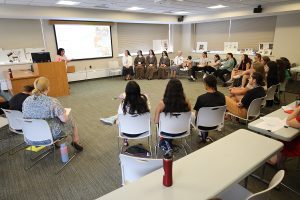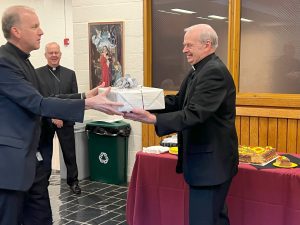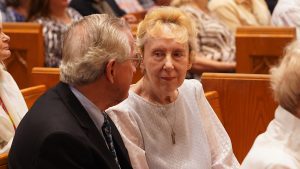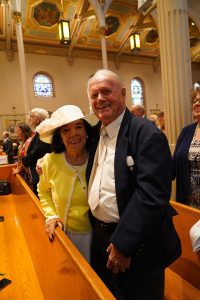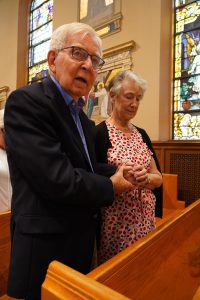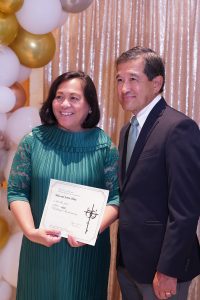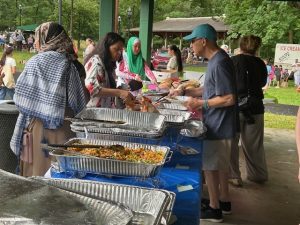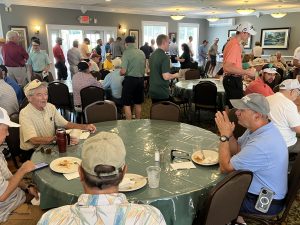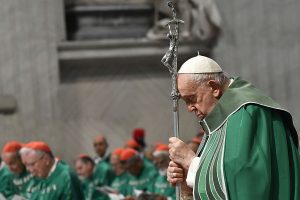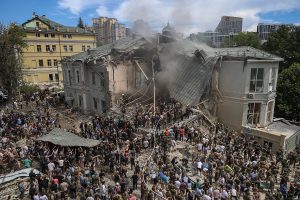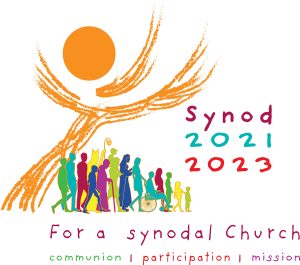SCRANTON – Four seminarians from the Diocese of Scranton pledged their intention to continue formation for the priesthood during a special Mass with the Rite of Candidacy at Marywood University on June 26, 2024.
Jeremy Barket of Sacred Heart of Jesus Parish in Dupont, along with Jacob Mutchler, Jan Carlo Perez, and Cody Yarnall, all of Saint Matthew Parish in East Stroudsburg, each indicated their desire to continue forming their mind and heart to serve Christ and His Church during the special Mass.
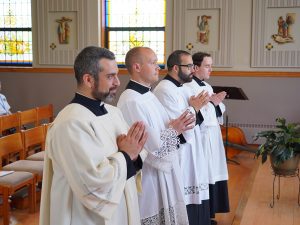
“What candidacy represents is a seminarian recognizing that, while his discernment is not completed, he has come to a point where he feels reasonably confident that he’s called to be a priest and he’s ready to begin the process of not only discerning where God is calling him, but actually preparing for priesthood,” Father Alex Roche, Diocesan Secretary of Clergy Formation, explained. “On the flip side, candidacy also represents the Church saying we have spent sufficient time with this man, we’ve worked with him, and we’ve seen the gifts that God has given him, and as a Church, we believe that he could be a good candidate for priesthood.”
Perez first entered seminary in 2017. He said the Candidacy Mass is an important step on his journey to the priesthood.
“It was the first time I got to say, ‘I do,’” he explained. “It has been a long time coming for me.”
Perez was drawn to the Catholic faith after being inspired by the stories of different saints. After his first year in college, he transferred to the seminary after feeling called to the priesthood.
“I want to be more like Jesus. He’s the center of everything, He’s the center of reality and I feel like He wants me to be more like him,” Perez explained. “I want to be an example to people. I want to help people. I want to serve people. I want to be holy, and I want to help lead people into deeper union with Christ in the Eucharist especially.”
Mutchler, who just finished his second year of philosophical studies at Saint Vincent’s Seminary in Latrobe, has relied on God to lead the way up until this point.
“I really brought to prayer, ‘Lord, if this is what you want, grant that desire,’” Mutchler said. “I have really experienced through prayer and through affirmation of brother seminarians and formators that this really makes sense. It really just seems to be fitting given where I am in my life and my experiences.”
Yarnall expressed deep gratitude for all the support he has received up to this point and called the Rite of Candidacy a grace-filled moment.
“It’s a continuation of God’s commitment to us. His invitation to extend grace to us, to draw us along in formation and for us to respond in love and fidelity,” he said.
Barket acknowledged the importance of the Rite of Candidacy, indicating this is where many people believe seminarians are considered true candidates for the priesthood.
“I tried to run away from the idea of the priesthood for a long time, but it just kept coming back to me,” Barket said. “I would be in church, and I would start having peace. I would listen to certain homilies, and I used to say, ‘Why isn’t the priest talking about this? Why isn’t he talking about that? If I was up there, I would talk about this and this and this.’ I thought, oh, if I was up there, well, what does that mean?”
After moving back to Dupont from Pittsburgh at the start of the COVID-19 pandemic, Barket felt called to enter the seminary.
“Every day I just trust that this is where God wants me. I’m excited to continue this journey,” he added.
The Most Rev. Joseph C. Bambera, Bishop of Scranton, served as principal celebrant and homilist for the Candidacy Mass, which was held in conjunction with annual Quo Vadis and Fiat Days at Marywood University.
During his homily, the bishop encouraged each candidate to deepen their resolve to follow Jesus.
“We pray today that you will continue to open your hearts to the call of the Lord, most especially to take all that you have learned and will be shared with you during these times of formation and translate them into lives that are open to the People of God and are willing to walk with them,” Bishop Bambera said.

